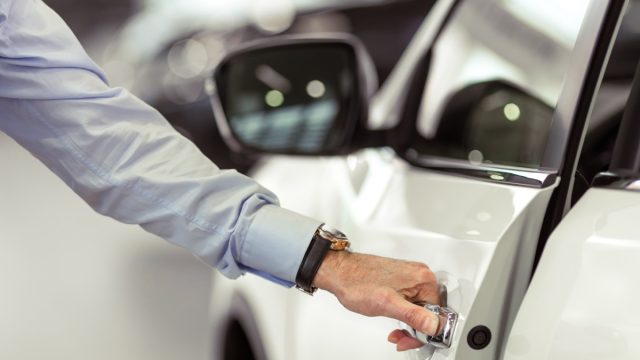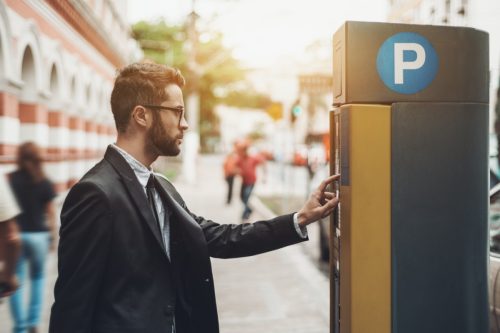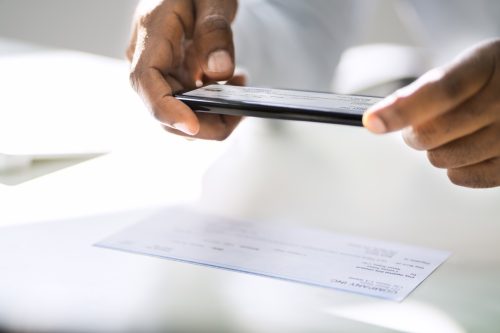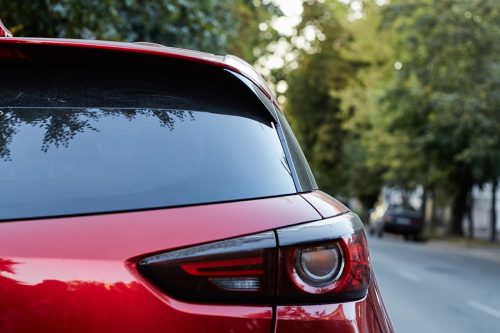If You’re Asked to Put This on Your Car, It’s a Scam, Police Say in New Warning

Cars are a common target for criminals, as they offer different opportunities for thieves to make a quick buck. You may worry that your car could be stolen or that valuable items might be snatched if you leave your doors unlocked. But sometimes, thieves aren’t interested in the purse or cellphone left on your front seat; instead, they’ll use your car as a decoy to steal from you in a more creative way. Read on to find out what people are being now asked to put on their cars, and why police say you should be wary of this offer.
READ THIS NEXT: If You See This on Your Car, “Do Not Remove It With Your Bare Hand,” Police Warn.
Car-related scams are nothing new.

The latest vehicle scam is just one of many that criminals have crafted. Over the summer, police in Fairfax County, Virginia, and Atlanta, Georgia, received reports of fraudulent parking tickets left on people’s cars. The tickets found in both states were convincing, using authentic-looking seals and formal language to fool victims. Tickets in Atlanta even had a QR code printed on them. When scanned, it opened an illegitimate payment website called “ATL Citations.”
QR codes have also been used in a parking meter scheme, where criminals affix stickers to meters in hopes that people will scan them and, again, pay through a fraudulent website. Now, scammers aren’t targeting your car in public settings—they’re attempting to con you while you’re at home.
You might receive something questionable in the mail.

Mail scams are fairly common, and a new one just surfaced in New York. On Oct. 17, police in Waverly issued a warning after receiving a concerning report from a village resident. According to a Facebook post, the resident “received a letter from a fraudulent company,” asking to pay him to install vinyl decals on his car.
There are businesses that will pay you to put stickers or wraps on your car, essentially acting as mobile advertising for brands, according to DollarSprout. This can be a quick and easy way to earn cash, but the Waverly Police Department (WPD) asks you to be wary about which companies you engage with.
RELATED: For more up-to-date information, sign up for our daily newsletter.
There are some common signs of fraud you can take note of.

Per the scam alert from WPD, the fraudsters included a fake check “with poorly worded instructions to have the check deposited.” After depositing, the letter instructed the Waverly resident to “quickly wire transfer a large portion of the money back to the company.” As payment for advertising, the resident was told that he could keep a small portion of the deposit for himself.
“The resident would continue to be paid in future installments in Amazon gift cards,” the WPD said in the Facebook post. “Luckily he knew this was a scam immediately and reached out to let us know.”
To stay safe, police warned residents to keep an eye out for these scams and to avoid depositing checks from an “unfamiliar source.”
This isn’t an isolated incident.

Unfortunately, these scams have been happening for years. Back in 2016, the Federal Trade Commission (FTC) issued a warning about “car wrap scams” and how to spot them. The agency warned that a message telling you to deposit a check and wire money back is a dead giveaway, much like it was in the Waverly case.
The deposited check bounces after you’ve already wired the requested funds—and if it gets to that point, you’re out of luck. “The money you kept as ‘your share’ disappears, and the money you wired is long gone—no getting it back,” the FTC said. “On top of that, you’re on the hook for paying your bank back for the fake check. And, of course, no one’s wrapping your car.”
Car wrap schemes surged during the COVID-19 pandemic, according to AARP, capitalizing on the fact that many had lost their jobs and were looking for income. Hardcopy letters aren’t the only way you can be targeted either. You might get a text or see an ad on a job board or a social media site to advertise an energy drink, soda, or snack food, and according to the Better Business Bureau (BBB), you might be asked to pay via a money transfer app like Venmo or Cash App instead of a wire transfer.
If you do lose money to these scammers, you can file a complaint with the FTC and report it to the BBB Scam Tracker.